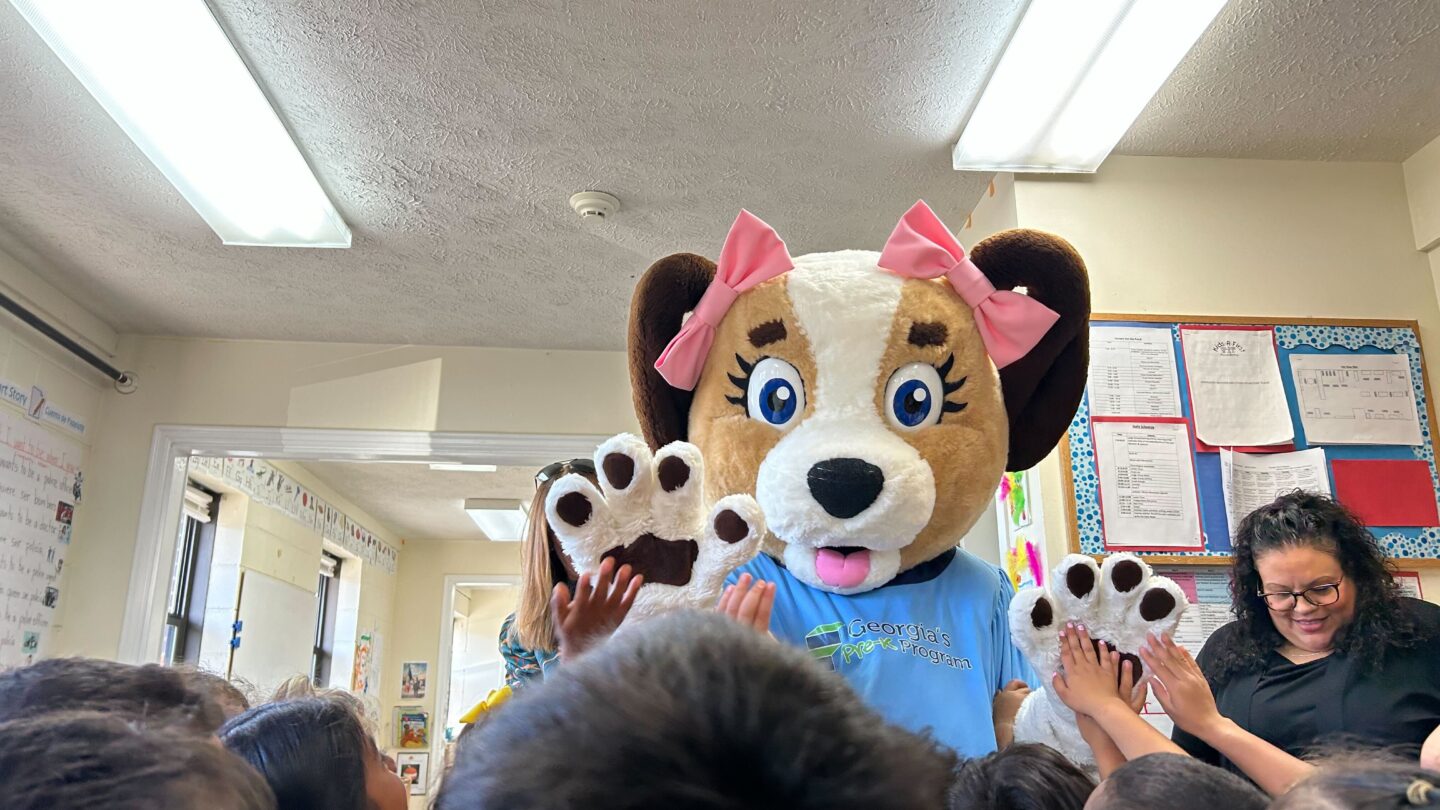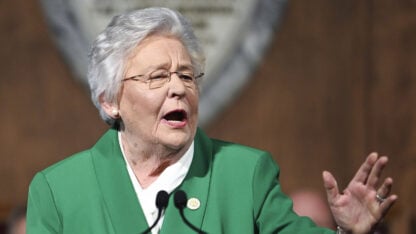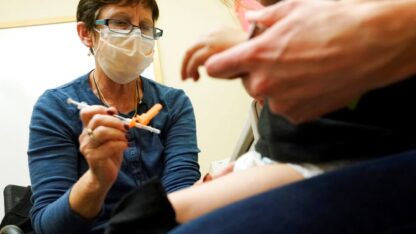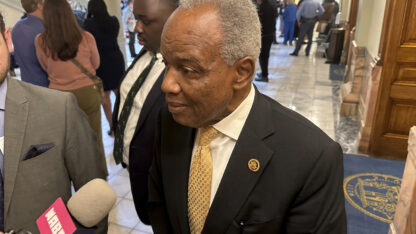On the first day of Pre-K Week this year, 22 four-year-olds gathered for storytime in the dual-language classroom of the Kids R First Academy in Marietta. Their eyes were fixed on a visitor: a woman with a book in hand, whom the toddlers affectionately called “Ms. Amy.”
Amy Jacobs — “Ms. Amy” — is the Commissioner for Georgia’s Department of Early Care and Learning. Her visit to Kids R First inaugurated this year’s state-wide celebration of Georgia’s pre-K program.
“We cheer for our teachers who teach us to read!” Jacobs exclaimed to the group of almost-perfected criss-cross-applesauce. She read from “Cheer” by Uncle Ian Aurora.
Joshua Ivey, an assistant teacher for the class of both Spanish- and English speakers, joined Jacobs for storytime.
“¡Vamos animar a nuestros profesores que nos enseñan a leer!” he followed suit.
The kids giggled and waited patiently as Jacobs and Ivey turned their pages to continue the story.
“We’ve been in the community for 15 years now, and we’ve noticed an increase in our South American families,” said the director for Kids R First, Alex Pyron. “That is when we decided to incorporate a dual-language classroom in our pre-K.”
“One of the important things to us is for our students to be able to learn in their native language and also start to adjust to the English language,” he continued. “By the end of the year, they’re just more prepared for kindergarten.”
Pyron’s mother, Virginia, is the one who founded Kids R First all those years ago. She said that preparing kids for the future is the foundation of her school’s mission.
But adding a Spanish-speaking classroom is not the only way Kids R First has adapted to shifts in the community in the last few years.
Staffing has also been challenging, especially after the COVID-19 pandemic.
“I wear a lot of different hats: bus driver, teacher, director, cook, you name it,” Pyron Sr. reflected. “But I love what I do.”
So do most early childhood educators.
“When you have a core–a good core–you can withstand all of these different obstacles that we’ve occurred in the last two years.”
Virginia Pyron, founder of Kids R First
However, according to Donna Davidson, president of Easterseals North Georgia, a love for teaching and children was insufficient to support folks through the pandemic.
“First of all, early education and care providers are among the lowest paid in the country,” Davidson said. “Early educators were attracted to other fields. You know, retail, jobs where perhaps they could work from home.”
According to the Center for American Progress, the childcare workforce lost about 88 thousand jobs between February 2020 and September 2022.
“And the Southern states were the most impacted with turnover,” Davidson added.
About 80% of childcare centers are understaffed in Georgia, and a lot of those vacancies were caused by the pandemic.
Davidson said this issue is not going anywhere.
As she thinks of what can be done in Georgia and across the country, she says it will take pointed action at the national level. Otherwise, “we’re gonna have a whole industry that’s going to collapse.”
“The pandemic set us back in many, many ways, and we have got to increase the pipeline of young talent going into those classrooms.”
Sen. Raphael Warnock
To some end, that ball is already rolling.
Sen. Raphael Warnock introduced the Headway Act in Washington, DC, earlier this fall.
This legislation would allow federal Head Start and Early Head Start educators to simultaneously work in the classroom while earning a required certificate for early childhood educators: the Child Development Association (CDA) credential. The bill is meant to give Head Start centers greater hiring flexibility.
Warnock is a Head Start alumnus, and part of the reason for this legislation is his experience visiting his old Head Start facility in Savannah, Georgia.
“I saw classrooms with bright young children waiting to learn, but I also saw several empty classrooms in that Head Start Center,” he said. “The pandemic set us back in many, many ways, and we have got to increase the pipeline of young talent going into those classrooms.”
Though Donna Davidson says that legislation like this is a step in the right direction, it still does not address the issue of teacher pay.
“I’m certainly more than willing to take a look at that,” Warnock said about compensation concerns. “Let’s get this bill over the finish line, but there’s no secret that, even as I do this, I’ve been working on this issue of making sure that people have ladders of opportunity from various perspectives.”
“I’ve been one of the clearest voices on the need to deal with student debt cancellation and I won’t back up one minute from continuing to make the case for that, as well as a whole range of other things that I think are smart investments in the future of our country,” he continued. “But this particular bill doesn’t cost a dime. It’s really just an important, but, I think, a smart change in the policy that could make a huge difference for the number of children that we’re able to serve and the number of young adults who are able to enter into the field of early childhood development.”
Virginia Pyron with Kids R First said that the understaffed landscape of early childhood education is a new normal.
“You gotta learn how to be ‘flex.’ If a teacher is out, I’ll go in the room,” she said. “Any of my classrooms, if you go in, I know all the kids. That’s what makes us a family.”
“When you have a core–a good core–you can withstand all of these different obstacles that we’ve occurred in the last two years,” she concluded.
The Georgia House of Representatives made a working group for early childhood education earlier this year. They have made workforce shortages one of their top priorities heading into the next regular legislative session in January.










